-
How Often Should You Clean Your Pool Filter?
The Ultimate Pool Filter Cleaning Guide
The thrill of owning a swimming pool often overshadows the responsibilities that come with it. While pools offer countless benefits, they also require consistent upkeep, including regular pool filter cleaning. To help you stay on top of maintenance, Deep Blue Pool and Spas is here to guide you through when and how to clean pool filters.
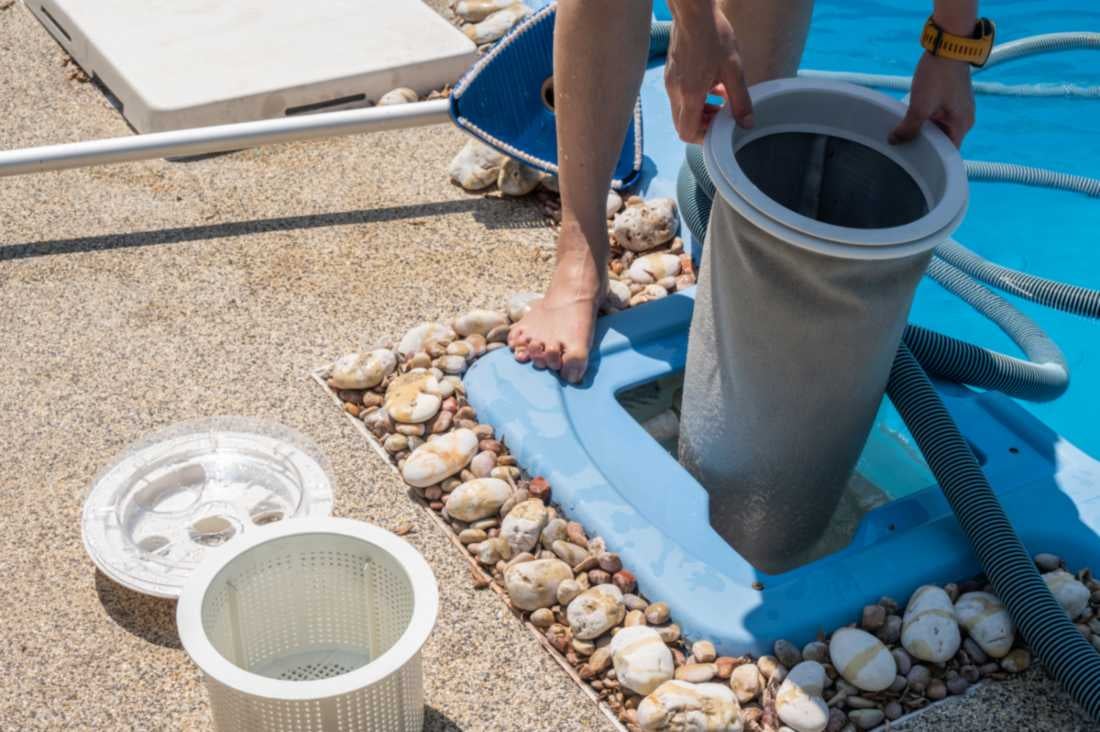
The Role of Your Pool Filter
The filtration system plays an integral role in any swimming pool’s performance, cleanliness, and integrity. These systems circulate the water to collect and eradicate debris and contaminants that may otherwise compromise your pool. Pool filters play a crucial role in maintaining clear water and a clean swimming environment.
The Importance of Pool Filter Cleaning
Pool filters are essential for keeping your pool water clear and clean. Over time, dirt, algae, and other debris accumulate in the filter, which can lead to unsanitary conditions and contamination. If not addressed, this buildup can cause serious issues, such as repairs and premature replacements.
The Risks of Overlooking Pool Filter Cleaning
At Deep Blue Pool and Spas, we encourage pool owners to get proactive about their pool filter cleaning. Failing to prioritize this essential task can lead to costly complications, including:
- Insufficient water circulation
- Unnecessary pool pump strain
- Cloudy or contaminated pool water
- Increased risk of premature system failures
What Is the Recommended Frequency for Pool Filter Cleaning?
Determining how often you need pool filter cleaning isn’t as straightforward as it might seem. The ideal cleaning schedule varies based on the type of filtration system you’re using, as each system has unique maintenance requirements and tolerances for debris buildup. Pool filtration systems come in three forms, including:
- Sand filters
- Cartridge filters
- Diatomaceous earth (DE) filters
How Often to Clean Sand Filters
Sand filters are the least labor-intensive, requiring less upkeep than alternative options. Sand filters should be cleaned when the pressure gauge is 8-10 psi above the clean pressure standard. However, depending on the filter media, pool environment, and subsequent maintenance, sand filters may only require a thorough cleaning every three to five years.
How Often to Clean Pool Filter Cartridges
The size of the cartridge influences the frequency of cartridge filter cleaning. In alignment with best industry practices, size-specific cartridge cleaning guidelines include:
- Small cartridge filters: Three to four week cleaning intervals
- Medium cartridge filters: Weekly or biweekly cleaning intervals based on pool usage
- Large cartridge filters: Three to four month cleaning intervals
How Often to Clean Diatomaceous Earth Filters
DE filters mirror the cleaning specifications of large cartridge filters. On average, these systems should be cleaned every three to four months. However, this timeline may vary depending on the integrity of the pool environment and the usage frequency.
Satisfying Your Pool Filter Cleaning Needs
An effective pool filter cleaning schedule depends not just on timing but also on proper cleaning techniques. Like maintenance schedules, cleaning methods vary depending on the type of filter you have. Deep Blue Pool and Spas is here to provide expert guidance on the best filter maintenance practices, helping you avoid guesswork and reduce the risk of potential damage.
How to Clean a Pool Filter
To clean a cartridge filter, remove and rinse the cartridge using a hose and/or soak it in a filter-safe cleaning agent. As DE and sand filters rely on filter grids, they should be backwashed to flush out debris and rinsed. DE filters must also be replenished with new DE powder after cleaning.
Effective Pool Filter Cleaning Strategies
With the right techniques, pool filter cleaning can be prompt and efficient. To improve the outcome of routine pool maintenance, adopt the following practices:
- Invest in a filter-specific cleaner to achieve unrivaled results
- Allow the filter to dry before putting it back
- Inspect and lubricate gaskets and O-rings as needed
- Avoid damage by adhering to manufacturer guidelines
Pool Filter Cleaning Made Easy With Deep Blue Pool and Spas
Pool filter cleaning isn’t complicated, but it can be time-consuming for those with busy schedules. Simplify your pool maintenance routine by leaving your filter maintenance to the experts at Deep Blue Pool and Spas. Contact us today to learn more about our pool care services.
-
Why is My Pool Water Green?
What Does It Tell You When the Water Is Green in Your Pool?
Nothing ruins the allure of your backyard oasis faster than the sight of green pool water. It’s not just an eyesore; it’s a sign that your pool needs attention. Whether it’s algae growth, chemical imbalances, or improper maintenance causing the problem, restoring your pool might feel overwhelming. Deep Blue Pool and Spas is here to help. With expert guidance on the essentials of green pool cleaning, we’ll provide you with the knowledge and tools needed to address the issue effectively. From diagnosing the root cause to implementing solutions, we’ll help you restore and maintain your pool’s crystal-clear beauty with confidence.
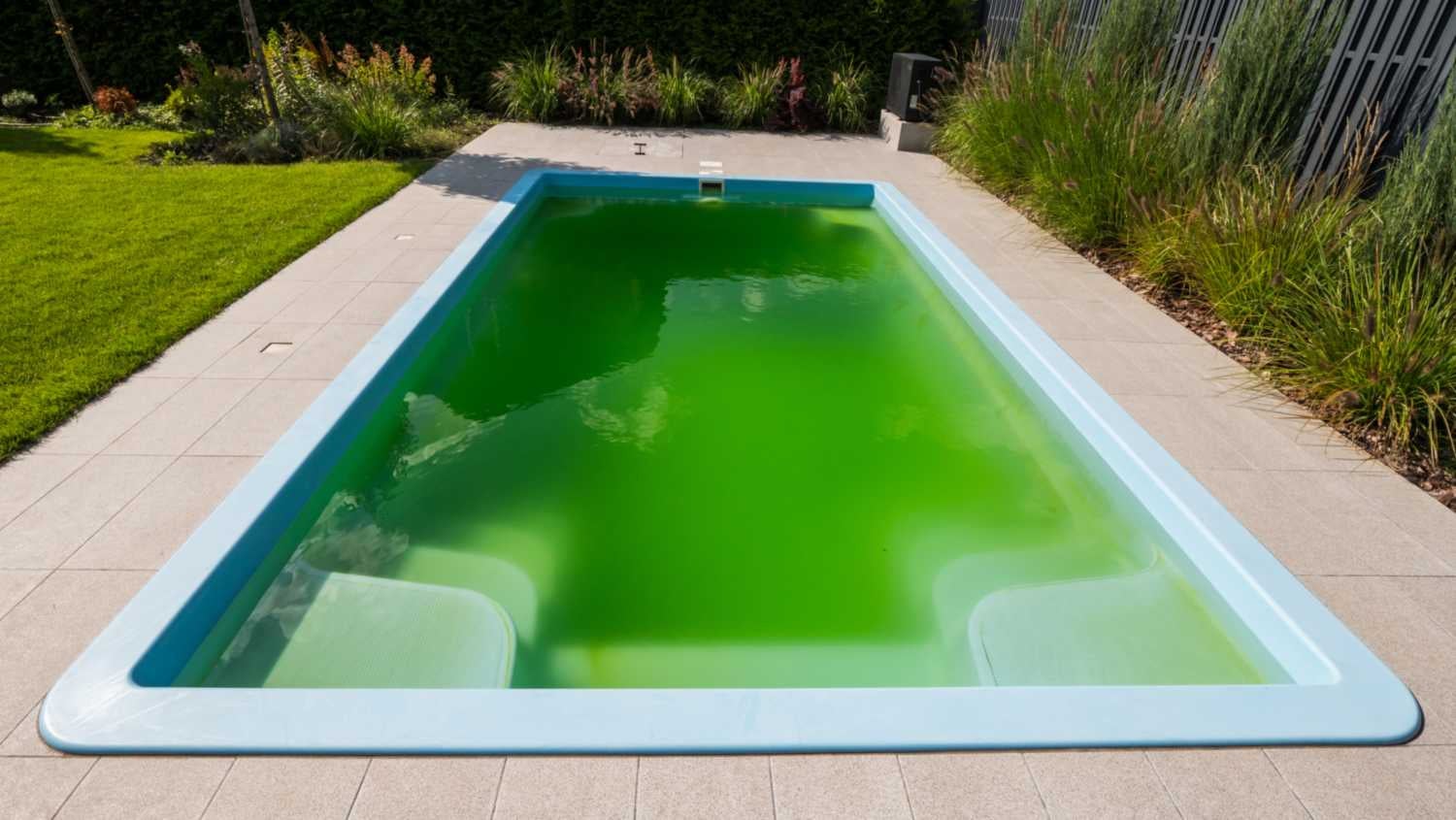
Why Does Pool Water Turn Green?
Before tackling green pool cleaning, it’s crucial to understand what murky or discolored water really means. Green water is often a sign of algae growth and insufficient maintenance. However, the issue can be more complex, requiring a closer look at potential missteps in your pool care routine to pinpoint the cause and find the right solution.
Lack of Maintenance
Crystal-clear waters are the result of consistent and proactive maintenance. Routine skimming, brushing, and vacuuming are non-negotiable to achieve and sustain a dazzling pool. Neglecting these essential cleaning tasks can create the perfect conditions for algae growth, resulting in the unsightly green water every pool owner wants to avoid.
Imbalanced Pool Chemicals
Chlorine and pH levels play an instrumental role in maintaining your pool’s hygiene, health, and overall appeal. Misjudging chlorine levels or neglecting regular adjustments can create an ideal breeding ground for aquatic organisms. Left unchecked, this can quickly lead to algae growth.
Solely Relying on Chlorine
While chlorine plays a vital role, it’s not the sole solution for maintaining a clean pool. Truly effective pool care and algae prevention require a comprehensive approach beyond this common chemical. At Deep Blue Pool and Spas, we encourage pool owners to incorporate a weekly algae inhibitor or suppressant treatment into their maintenance plans.
Compromised Filtration Systems
The integrity of your pool’s filtration system is directly linked to the color of your pool water. When a filtration system starts to fail, water circulation slows, allowing debris to accumulate. This debris often includes organic matter like leaves, which provide the nutrients algae need to flourish.
Factors That Influence Algae Growth
In addition to improper maintenance and chemical imbalances, several other factors can contribute to the growth of algae. These factors include:
- Excess heat and sun exposure
- Insufficient water circulation and/or filtration
- Organic matter and debris that double as algae nutrient sources
- Elevated phosphate levels and/or nitrates
Is It Safe to Swim in a Green Pool?
We advise pool owners to steer clear of green water. Even moderate discoloration can indicate water contamination, elevating the risk of coming in contact with various bacteria and pathogens which can lead to infections. Moreover, algae creates a dangerous environment by obstructing visibility and making the pool slippery.
How to Avoid Green Pool Water
Although problematic, green pool water is almost entirely avoidable. Maintain sparkling waters by prioritizing proactive maintenance. At Deep Blue Pool and Spas, we recommend:
- Routine pool cleanings, including skimming, brushing, and vacuuming
- Periodic chemical testing and balancing
- Weekly algae suppressants/inhibitors
- Professional pool maintenance services
Green Pool Cleaning
Once you’ve answered the question, “Why is my pool water green?” it’s time to take action. To restore the clarity and hygiene of your pool, employ the following:
- Water chemistry testing and balancing
- Chlorine shock treatment to eradicate existing algae
- Brush the pool walls/floor
- Leave the pool filter running for up to 48 hours
- Vacuum the pool
- Re-evaluate water chemistry
Learn More About Green Pool Cleaning Today
Say goodbye to discolored water and unwanted algae growth with the help of Deep Blue Pool and Spas. We offer expert guidance on everything from simple preventative care to professional cleaning and maintenance services, ensuring that your pool stays in top condition year-round. Our team is dedicated to making pool care easy, helping you avoid common pitfalls that lead to green, murky water. Contact our friendly team to learn more today.
-
Essential Steps in Caring for Your Solid Pool Cover
After your pool installation in Salt Lake City, using your pool cover the right way will protect your investment. As you need regular swimming pool maintenance , your cover will also need some special attention now and then to ensure that it stays in good condition and protects your pool properly. If you have a sold pool cover, follow these steps to care for it.
Spot Check Your Water Line
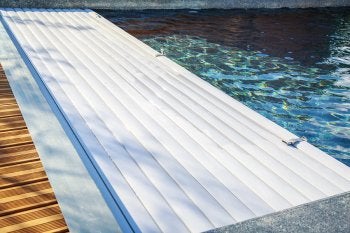
Your water line is important to more than your skimming system. If there is heavy debris on the surface of your solid cover, such as snow, water from heavy rains, or limbs, and the water line is so low that it doesn’t support your cover from underneath, then your pool cover can become damaged or wear out sooner than it otherwise would. When your pool is not in use for long periods of time, periodically perform water level checks to prevent excessive stain on your pool cover.
Prevent Chemical Damage
The chemicals you put in your pool to keep the water clean and balanced could cause damage to your swimming pool cover. When you add chemicals, avoid putting the cover on for at least two hours. This will allow the chemicals to dissolve in the water and the levels to balance out. If you put your pool cover on right after treating your water, the chemicals could still be sitting on the surface of the water and damage the pool cover.
Clean Your Pool Cover
Your pool cover should be cleaned about once every three to six months. Use mild dish soap and a hose to wet the surface, and then scrub it with a pool brush. Rinse the soap off and use a cover pump on the liner to get rid any water that accumulates. If you notice any mold growth, wash the affected area with diluted bleach, being sure to rinse it off completely. You can reduce the chances of mold growth by making sure your cover is dry before storing it.
-
Are You Backwashing Your Sand Filter Properly?
Swimming pool companies in Salt Lake City recommend backwashing the sand filter about every week, or more frequently if your pool gets a great deal of use. Ideally, you should do this pool maintenance task right after you vacuum your pool. Watch this quick video for a demonstration of the proper way to backwash a sand filter.
This pool maintenance expert directs viewers to turn off the sand filter, and then affix the backwash hose to the backwash nozzle. Screw on a hose clamp, and adjust the multiport valve from the filter setting to the backwash setting. It should run for about a minute. Then, you’ll adjust the setting to rinse, and finally turn the setting to filter. Once you’ve completed these steps, your lap pool is ready for use again.
-
Swimming Pool Maintenance FAQs
Becoming a new pool owner is exciting. Dealing with daily pool maintenance is somewhat less thrilling. When you imagined having your own pool at home, you probably thought about how nice it would be to relax on a float on a hot day, get more exercise swimming laps, and give the kids a place to play outdoors. Weekly shock treatments and daily debris skimming probably wasn’t part of your daydream. But, the good news is that you don’t have to manage it all by yourself. A pool contractor in Salt Lake City will give you all the information you need to make decisions about your professional maintenance schedule.
What’s the easiest way to stay on top of pool maintenance?

The easiest, hassle-free way to keep your pool at optimum conditions is to hire a swimming pool company to handle your maintenance tasks for you. Even if you do schedule regular services, you’ll probably want to handle a few minor tasks yourself. Create a written maintenance schedule, which might look something like this:
- Skim debris daily
- Vacuum once weekly
- Run the pump 10 to 12 hours daily
- Chemically treat twice weekly
- Shock once weekly
- Do safety checks of equipment every other month
Of course, your own maintenance list won’t replace professional services, as these are only some of the tasks that need to be done regularly.
How can I balance the calcium hardness?
Hard water makes your pool cloudy and can cause sediment to accumulate inside the plumbing. Water that’s too soft is corrosive. Eventually, it can corrode the metal and crumble the concrete. Ideally, you should keep the calcium hardness at about the middle of the 150 to 400 ppm range. Check the level every one to two weeks. Raise the level simply by adding calcium chloride. Lower the level by draining and replacing some of the water, or by using a flocculant. A flocculant will clump the extra calcium, and you can then remove it by cleaning the walls and bottom of the pool, and then backwashing and cleaning the filter.
How can I keep ducks out of my pool?
Ducks are certainly cute, but they’re also messy, and letting them use your pool will make your pool maintenance tasks more of a headache. Perhaps the least expensive way to duck-proof your lap pool is to introduce some of their natural predators. Find pool floats that mimic the size and appearance of alligators, snakes, dolphins, or killer whales. Leave the floats in the water whenever you aren’t swimming.
-
Top Reasons You Need a Swimming Pool Cover
Maintenance is essential if you want to keep your swimming pool installation serving Salt Lake City in top shape, but what do you do about the offseason? Big and small pools can both benefit from a pool cover, which can lower maintenance requirements and keep your family and pets safe during the colder months. A pool cover can even help maintain the amount of water in your pool, which protects the environment and saves you some hassle when you open your pool again during the summer. Here is a closer look at the top reasons you need a swimming pool cover.
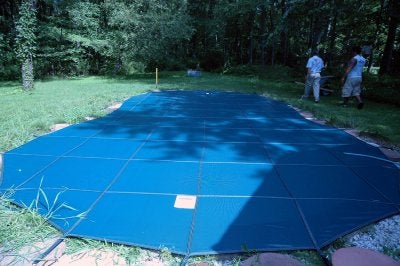
Cut Down on Maintenance Needs
Swimming pool maintenance tends to be a simple enough process, but why not make it even easier? It’s one thing to skim your pool during the summer, but it’s probably not something you’d want to be doing during the winter. When you use a pool cover, you won’t have to worry about removing bugs, leaves, or other debris from the water. This means your list of chores will be one bullet point shorter when the weather gets colder. If you don’t want to skim your pool all year long, consider using a pool cover to shield the water.
Protect Your Family
Just because the weather cooled down, it doesn’t mean your pool will automatically freeze over. You might stop paying so much attention to your pool area when you’re not using it, but your kids and pets might have a different idea. Although all pool areas should be enclosed or protected in some way, kids and pets tend to make their way into the prohibited zone regardless. A pool cover helps to keep your family safe. Even if your kids or pets do make it into the pool area, the cover will prevent them from falling in.
Preserve Your Water
If you don’t want to have to deal with completely refilling your pool when the summer rolls back around again, a pool cover can help. It will prevent your water from becoming contaminated, and it will also retain water that might otherwise evaporate on warmer days.
-
Keeping Pests Out of Your Pool
For many people, it’s tough to beat relaxing in the pool on a summer day. When pests decide to take over your pool, however, it can be hard to relax. Regular pool maintenance near Salt Lake City keeps your water clean, healthy, and refreshing, but how do you keep bugs out? Make sure you use a pool cover during the offseason so you don’t create a breeding ground for pest problems, do away with places pests can hide, and think about putting up a fence around your in-ground pool. Read ahead for details on these helpful tips.

Use a Pool Cover
When you close your pool up for the season, you might forget about it altogether until the warm weather rolls around again. If you want to make sure that pests don’t make themselves at home in your pool, it’s a good idea to close it up with a cover. Pool covers will seal out insects, rodents, and other pests that might otherwise set up habitats and start families in or around your pool. A cover can help, but you need to find one that fits your pool and install it properly.
Get Rid of Hiding Spots
Pool covers can be helpful, but they’re typically only used during the offseason. When there’s still plenty of time before you close yours up for the year, you’ll need to take additional steps to keep pests away. When you’re going through your swimming pool maintenance routine, make sure to keep an eye out for places where pests might be hiding. Bushes and growth around your pool can serve as habitats for pests and make it easy for them to spread into your pool, so get rid of these potential hiding spots.
Install a Fence
Pool fences can help keep children and pets safe, and they can also keep pests away from your swimming pool. Look for a fencing style that will do an adequate job of keeping small critters away—wood and vinyl fences may be ideal materials for a job like this. Choose a fence that doesn’t leave any room to sneak by.
-
When to Cover Your Pool or Spa
Pool covers are designed to protect pools when they are not actively in use. After you complete your swimming pool installation near Salt Lake City, your pool contractor may recommend that you purchase and use a cover for your new pool. By getting in the habit of covering your pool when you are not using it, you can prevent the need for extensive swimming pool services or repairs in the future.
There are a few instances when you will definitely want to cover your swimming pool. Your pool cover should be used during the winter season if you decide to not drain your pool. By covering up your pool over the winter months, you can prevent damage to your swimming pool filter and heater. Your pool cover will also keep leaves and debris out of your pool area. If you are a parent of young children, you should also cover up your pool to prevent your kids from accidentally falling into the pool if they are unattended.
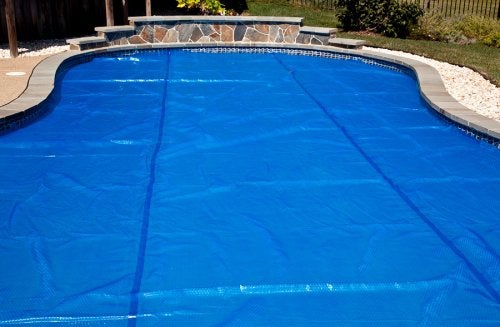
-
Why Scheduling Professional Pool Maintenance Makes Sense for Busy Families
A swimming pool is a wonderful feature to have in your backyard—it is great for exercising, playing games with kids, and hosting parties. However, it is essential to keep up with pool maintenance . The good news is that professional pool maintenance in Salt Lake City is available to help busy families enjoy their pool safely and without hassle.
If you are a parent, you know how precious your free time is. Instead of spending time every week cleaning your pool and balancing its chemicals, you can let a professional do the work and spend your free time doing something you actually enjoy. Professional swimming pool services can also help you save energy that you can then use participating in your hobbies. In addition, if you set up a pool maintenance schedule with your pool contractor, you can rest assured that your pool will always be clean and safe for swimming whenever you and your family want to take a dip.
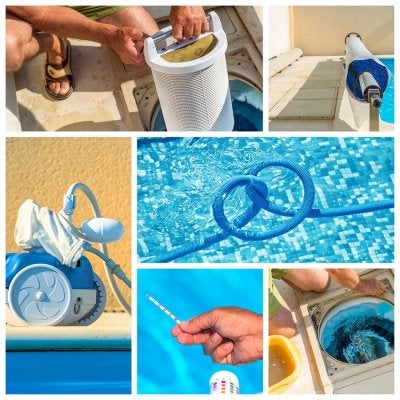
-
Why It’s Important to Clean Your Pool’s Cartridge Filter
The right type of pool maintenance near Salt Lake City can help your investment last for as long as possible, and it can keep it working efficiently throughout that time as well. Your pool’s cartridge is one of many components and systems that allow large and small pools to function properly, but you need to keep it clean. There are different methods that you can use to clean this swimming pool component, and some are more thorough than others. If you want to keep your pool in top shape , keep reading to find out why it’s important to clean your pool’s cartridge filter.
Your swimming pool installation is essentially a large basin of water that is consistently exposed to a variety of elements. In order to keep the water safe for human exposure, you will need a functioning filter. A cartridge filter is one type of swimming pool filter that removes contaminants from the water. Although cleaning your cartridge filter with a regular hose can be effective in some cases, chemical cleanings can be even better. A dirty cartridge filter can make the water unpleasant and even unhealthy for swimmers, so talk to your pool contractor about having it cleaned.
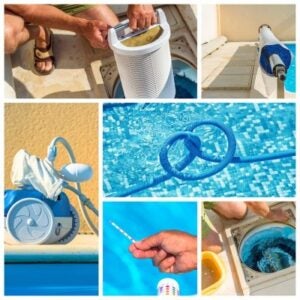
RECENT POSTS
categories
- Uncategorized
- Hot Tub Installation
- Swimming Pool Installations
- Swimming Pool Design
- In Ground Pools
- Swimming Pool Maintenance
- Swimming Pool Service
- Swimming Pool Repair
- Outdoor Fireplace
- Outdoor Fire Pit
- Pool Safety
- Deep Blue Pools and Spas
- Exercise
- Swimming
- Outdoor Kitchen
- Pool Chemicals
- Chlorine Levels
- Water Feature
- Burning Calories
- Pool Contractor
